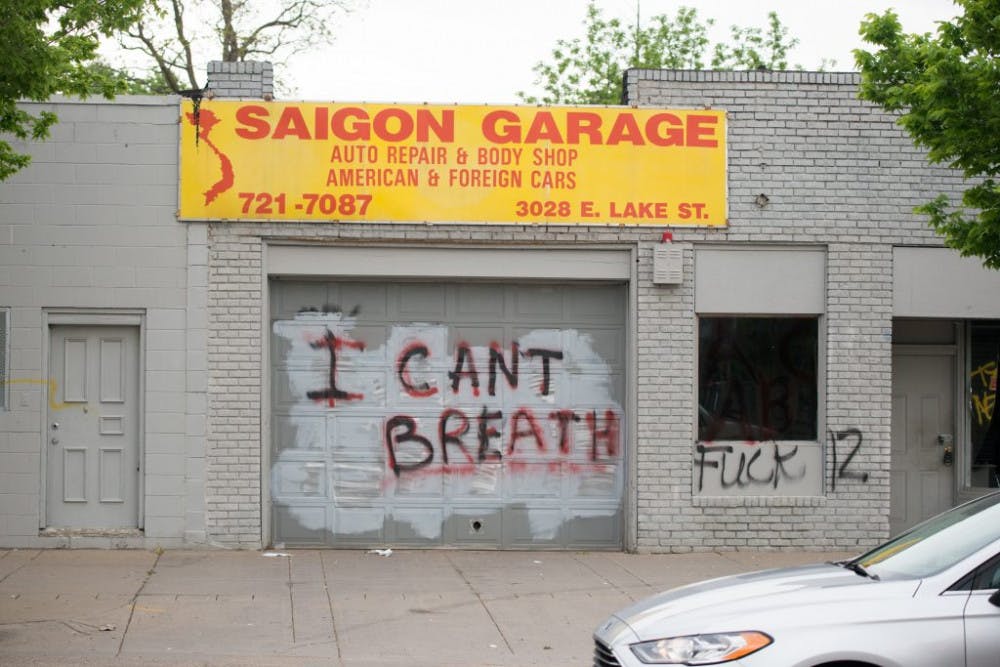“I can't breathe.”
Those were the last words uttered by George Floyd, a 46-year-old African American father of two, last Tuesday while former Minneapolis Police Officer Derrick Chauvin kneeled on his neck for several minutes, even after his body went limp.
In the days since, American cities have erupted in protest and violence over yet another instance of violence perpetrated against an African American civilian, which in turn has been met by more police violence against demonstrators -- a cycle which has become all too familiar in America. The protests are reminiscent of those that erupted in 2014 over the death of another African American man at the hands of a white police officer, Michael Brown. Of course, this is happening all while the President of the United States douses an already combustible situation with demagoguery and racism, a ghastly yet unsurprising dereliction of leadership.

The generally peaceful protests that have greeted cities during the day have been met by violence and looting at night, with one notable exception.
On Saturday, thousands of protesters gathered in downtown Newark -- a city still visible with scars from the 1967 Newark Riot -- and demonstrated peacefully under the leadership of Mayor Ras Baraka and Larry Hamm who heads the People’s Organization for Progress, a progressive grassroots political association. The demonstration remained largely peaceful throughout the four hours that it lasted and police (notably absent of riot gear and non-lethal weaponry) allowed protesters to share their voices, stories and collective pain unimpeded.
Sadly, this has not been the case everywhere, and now more than ever it has become important for the denizens of this country, which has systematically failed its black, brown and indigenous communities for centuries, to rise up and speak out passionately and angrily about the unabashed racial violence perpetrated on these communities daily by police and others.
Despite the fact that protests against this very evil were taking place as little as a few miles away from Seton Hall’s main campus in South Orange and blocks away from its law school, and despite the fact that the University promotes a “45% diversity rate” among its student body, Seton Hall put out a disappointingly underwhelming statement on Saturday on the unrest and violence currently sweeping the country.
“As a Catholic community of faith committed to diversity and inclusion, we reaffirm our conviction that racism has no place — anywhere,” the statement read. “Our Church proclaims that human life is sacred and that the dignity of the human person is the foundation of a moral vision for society.”
The statement is made even more troubling by the fact that it was only two years ago that Seton Hall was embroiled in its own protest for several days as student activists from the Concerned 44 group occupied the lobby of President's Hall in an unprecedented attempt to demand greater attention from the University on issues of racial inequity.
Though the University’s statement was underwhelming, just as eye catching has been the silence from Seton Hall’s Student Government Association, an organization that exists solely to represent the student body. In fairness, classes are not in session right now and members are likely scattered across the nation, but if anything has been learned from the coronavirus pandemic it is how to communicate from a distance -- a feat that the SGA showcased by holding a remote forum via Microsoft Teams in April.
It is the job of these two organizations, in particular, to make students feel not just welcome at this University, but heard. To make them feel like valued members of our shared community, something Mayor Baraka and Larry Hamm did at Saturday’s protest in Newark, a protest that should serve as a model for catharsis, healing and social activism in the wake of Floyd's death.
Yet, we have seen no such leadership on this front at Seton Hall.
No messages of comfort. No meaningful condemnation of racism or racial violence, even as American cities like New York, Philadelphia, Minneapolis, Atlanta and Los Angeles burn before our eyes in fires fueled by anger and injustice. Injustices that have been nary acknowledged, let alone corrected, by white society. Not even as we watch on live television the brutalization of demonstrators -- some of whom might even be fellow Pirates -- protesting peacefully in the streets while police and National Guardsmen in riot gear march in lockstep, dispersing crowds as cities nationwide hand new curfew orders down.
The only way this country can begin to heal is for leaders to address the racial strife that exists within this country head on and at all levels. Political leaders, business leaders and cultural leaders all must rise up in condemnation against not just the officer who killed Floyd, but against the system of policing that exists in the United States that has allowed thousands of others like Floyd to be killed in encounters with the police. To rise up against a system that has Black men and women fearing for their lives every time a cop pulls up behind them on the road. To rise up against a system that has promoted a racially inequitable society on various fronts.
As the popular protest phrase goes, “white silence is violence.”
But it is no longer enough to simply denounce the problem -- instead, Seton Hall and the SGA must address how they plan to be a part of the solution.
The Voice is intended to best represent the collective opinion of The Editorial Board. It is written by The Setonian’s Editor-in-Chief.





